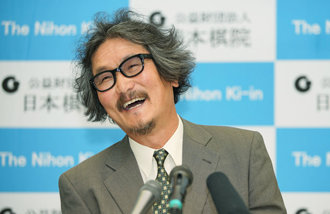Ex-U.S. Nuke Negotiator Speaks on Bilateral Ties
Ex-U.S. Nuke Negotiator Speaks on Bilateral Ties
Posted April. 23, 2008 05:12,
Developing the U.S.-Korea alliance into a global partnership will not only enrich the bilateral relationship but is also in Koreas interests, said former U.S. Assistant Secretary of State Robert L. Gallucci in an exclusive interview with the Dong-A Ilbo.
On Korean President Lee Myung-baks summit talks with the United States and Japan, Gallucci said the meetings are significant in that they created a healing environment and promoted future-oriented cooperation.
Gallucci, now the dean of Georgetown Universitys School of Foreign Service, helped reached the 1994 Framework Agreement with North Korea in Geneva. The following are excerpts from the interview.
Q: What is your opinion of the Korea-U.S. summit?
A: There was no stunning news in the summit, but President Bush seemed to be far more comfortable with President Lee Myung-bak than former Korean President Roh Moo-hyun. President Lee is on the same page with Washington in that Korea and the U.S. should work together for the development of the alliance. In particular, the two leaders said things in unison on approaches to the North Korean nuclear issue.
Q: Some say the Korea-U.S. relationship, which was damaged under the Roh administration, is now being healed.
A: Things that stand in the way of the alliance can always happen. When the North Korean nuclear issue seems resolved, the North strains inter-Korean ties, and when that relationship seems restored, the nuclear issue poses an obstacle. Trade disputes and undesirable things related to U.S. forces in Korea can occur, like the deaths of two Korean girls at the hands of a U.S. armored vehicle. But the atmosphere surrounding the foundation of the bilateral relationship has become very favorable.
Q: A strategic alliance or global partnership is now being emphasized. What does this mean to the U.S.?
A: Korea may not know well how precious the dispatch of Korean troops to Iraq was. Intrinsically, the U.S. can do nothing but hope allies will share the burden of the international issue. Whoever becomes the [U.S.] president among the three candidates, he or she will value Americas global role and hope America will integrate closely with allies.
Q: What is the specific global partnership that the U.S. wants?
A: Depending on time, the focus is different. The U.S. is anticipating help from allies for Iraq and Afghanistan. It may hope for logistics, forces or financial assistance. Korea is a vital society and a strong country with a thriving economy, and is becoming geopolitically important. The U.S. hopes to share the burden with Korea to the level on par with [Koreas] status.
Q: Skeptics are asking what tangible benefits Korea may gain through global partnership.
A: Take the case of Japan. Japan is trading with the world as a global player. At stake are the stability and peace of the world order and safe access to the market. The scale may be different but that is no exception to the U.S. and Europe. Korea also needs resources such as oil and materials. Efforts to maintain an open global economy and sustain a stable world order are beneficial to Korea by any means. Deciding which one will be helpful to Koreas interests depends on Koreans.
On the emergence of China, many discussions are being made about Koreas future. China is an emerging power and America is an old superpower. We have to think a scenario of Korea being unified within two decades. Some forecast that Korea might resort to China again, but from the viewpoint of traditional international politics, the alliance with the U.S., a country thousands of miles away from Korea, will be very helpful for Korea, which borders superpowers.
Q: President Lee has emphasized a future-oriented and pragmatic Korea-Japan relationship but the history issue still plagues bilateral ties.
A: Korea and Japan have history but a future unstrained by such history also lies ahead of them. Superpowers like the U.S., China and Russia surround the two countries. A stronger understanding and cooperation of the security situation in Northeast Asia will prevent a direct arms race, animosity and territorial disputes between the two countries. There is no structural element that both countries should dispute over geopolitically.
Q: President Lee has proposed setting up a liaison office in North Korea but the North has not responded.
A: I hope the proposal is not exploited in the manner of sending the ball to the other court. I hope North Korea does not close the door as soon as it gets mad at South Korea, but it can become a system that continues to work to produce results. If [the proposal] had been made under the Roh administration, the Bush administration might have felt that South Korea went a step ahead before the nuclear issue was clearly addressed, but now, the U.S. seems to accept it as a good idea.
Q: Some warn that the Bush administration could overlook North Koreas uranium enrichment and nuclear assistance to Syria.
A: I am aware that North Korea agreed to recognize the importance of Syria. This agreement is not an end but is on a continuum, and Syria and the uranium issues are important per se. It seems the agreement was reached for flexibility and pragmatic interest.
Q: Is there any room for subtle conflict between Korea and the U.S. over the nuclear issue?
A: Seoul and Washington must understand exactly what Pyongyang is pursuing. That is political relations with the U.S. It comes above energy, food and financial assistance. If Seoul can accept it, it is the best. Pyongyang will not be able to drive a wedge between Seoul and Washington.
sechepa@donga.com







